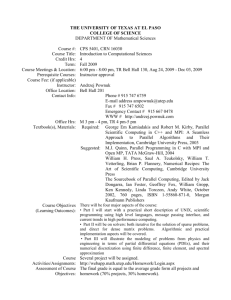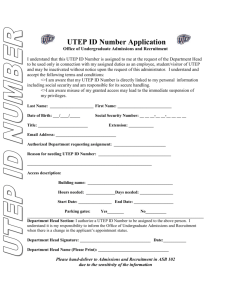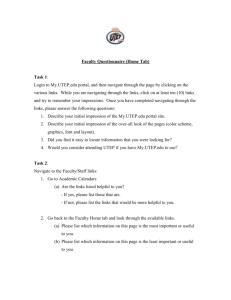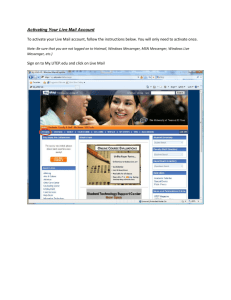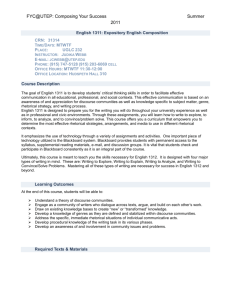File
advertisement
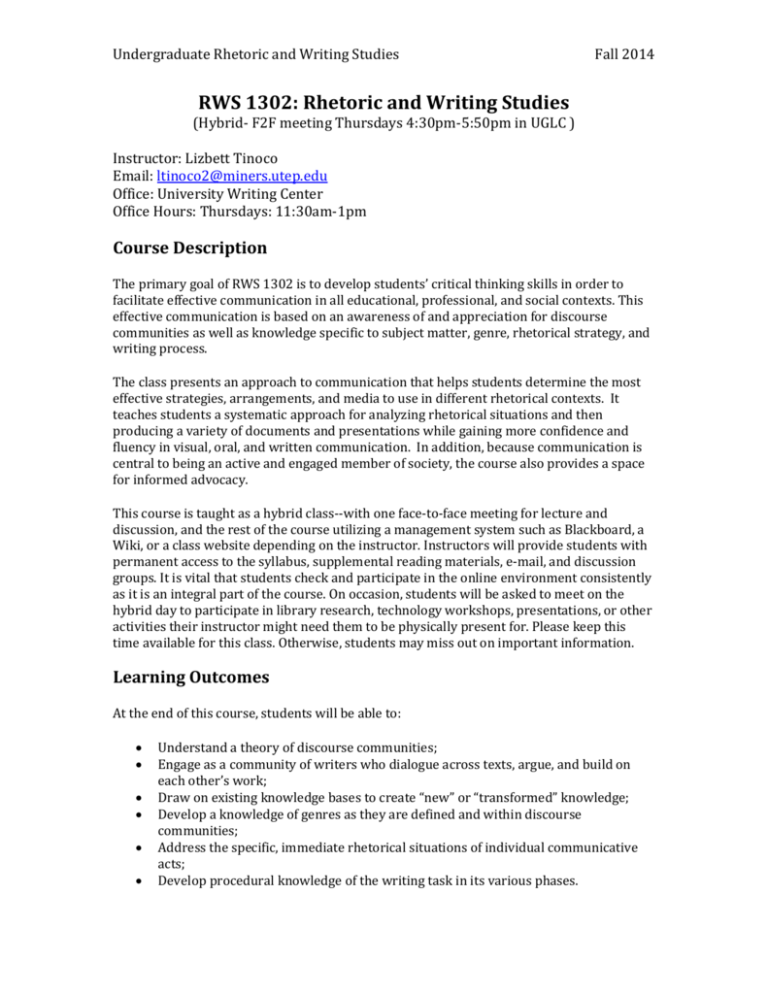
Undergraduate Rhetoric and Writing Studies Fall 2014 RWS 1302: Rhetoric and Writing Studies (Hybrid- F2F meeting Thursdays 4:30pm-5:50pm in UGLC ) Instructor: Lizbett Tinoco Email: ltinoco2@miners.utep.edu Office: University Writing Center Office Hours: Thursdays: 11:30am-1pm Course Description The primary goal of RWS 1302 is to develop students’ critical thinking skills in order to facilitate effective communication in all educational, professional, and social contexts. This effective communication is based on an awareness of and appreciation for discourse communities as well as knowledge specific to subject matter, genre, rhetorical strategy, and writing process. The class presents an approach to communication that helps students determine the most effective strategies, arrangements, and media to use in different rhetorical contexts. It teaches students a systematic approach for analyzing rhetorical situations and then producing a variety of documents and presentations while gaining more confidence and fluency in visual, oral, and written communication. In addition, because communication is central to being an active and engaged member of society, the course also provides a space for informed advocacy. This course is taught as a hybrid class--with one face-to-face meeting for lecture and discussion, and the rest of the course utilizing a management system such as Blackboard, a Wiki, or a class website depending on the instructor. Instructors will provide students with permanent access to the syllabus, supplemental reading materials, e-mail, and discussion groups. It is vital that students check and participate in the online environment consistently as it is an integral part of the course. On occasion, students will be asked to meet on the hybrid day to participate in library research, technology workshops, presentations, or other activities their instructor might need them to be physically present for. Please keep this time available for this class. Otherwise, students may miss out on important information. Learning Outcomes At the end of this course, students will be able to: Understand a theory of discourse communities; Engage as a community of writers who dialogue across texts, argue, and build on each other’s work; Draw on existing knowledge bases to create “new” or “transformed” knowledge; Develop a knowledge of genres as they are defined and within discourse communities; Address the specific, immediate rhetorical situations of individual communicative acts; Develop procedural knowledge of the writing task in its various phases. Undergraduate Rhetoric and Writing Studies Fall 2014 Engage reflection about their own learning. Students will also have the opportunity to strengthen skills sets in the following areas: Think, read, and write critically; Formulate research questions and perform primary and secondary research to answer those questions; Become familiar with the contents of the UTEP Library, in a variety of forms and areas of professional study (e.g. the arts, humanities, sciences, nursing, social sciences, business, engineering, and education); Analyze and synthesize material from outside sources; Develop a sensitivity to the significance of data and how it can be rhetorically applied to various genres; and, As part of a research process, apply research to various genres; receive instruction in the logic and form of documentation within a discipline (APA); learn writing strategies for integrating source material into your own prose (quoted, paraphrased, and summarized material); write analytical and argumentative papers appropriate to genres and larger discourse communities. Required Texts and Materials Readings posted on Bb Course Policies Project Format All projects must be word-processed and saved as a .doc file. They should be in 12 pt. font, have one-inch margins, and be double-spaced. Use a font style that is easily readable like Times New Roman, Arial, or Georgia. Microsoft Word is available to students at all campus computers and can be purchased at the UTEP Bookstore using a current UTEP ID card at discount. Students may also go to openoffice.org and download a free and compatible version of Word/Office. Be sure to name each submitted assignment with your first initial, last name, and an abbreviation of the assignment. For example: jmartinez rhetanalysis draft jmartinez rhetanalysis final Participation/Attendance Because this is a hybrid course, attendance is determined by class participation both in class and online. Students must be prepared, participate in online discussions, and attend the face-to-face class consistently to understand and incorporate the rhetorical strategies and Undergraduate Rhetoric and Writing Studies Fall 2014 processes used to complete the projects. Participation is worth 15 percent of the final grade. University Writing Center UTEP’s University Writing Center (UWC) offers free writing tutoring assistance for all UTEP students. The tutors are undergraduate and graduate students who can help with all parts of a writing assignment including prewriting, organizing, revising, and editing. They can also help to understand any writing assignment and help work on comprehending difficult textbook material. Note: To facilitate revision, UWC tutors will not hold a tutoring session fewer than 12 hours before the assignment is due. Technology and RWS 1302 This course makes heavy use of technology and multimedia. It is strongly recommended that students have access to the Internet from home and are comfortable using a computer. If home access is not possible, arrangements can be made to use a computer regularly on campus in order to complete the work. Student computer labs such as ATLAS are often available until midnight, but schedules do vary. A great deal of work will be done online, and not having access to a computer will not be an excuse for incomplete or late assignments. Technology problems are also not an excuse for work that is late or missing. Students need to get into the habit of completing assignments for this course well before the due date to allow time for dealing with technology problems. Expect that at some time, the network will be down, computers will go on the fritz, or some other small catastrophe will occur. If students are prepared ahead of time, they can go to plan B. Instructions for Accessing Your Course Online Students must have a UTEP email ID and password before they can access Blackboard. UTEP automatically generates an e-mail ID for students when they are officially admitted to the university. Any questions or problems can be directed to the Helpdesk at 747-5257. All the course content will be delivered via Blackboard. Students can access Blackboard by the steps outlined below: Go to http://my.utep.edu Login is e-mail ID. Password is e-mail password. Click on the link to Blackboard Once logged into Blackboard, all the courses a student is registered for are listed under the appropriate semester. Click on the course title to access the course. Email Policy: I will only accept emails from your official UTEP email address or through Blackboard. Please include an email subject and address the email in a professional manner. I will always respond within 24 hours. I will request that you meet with me during office hours as I will not discuss writing or grades via email Undergraduate Rhetoric and Writing Studies Fall 2014 Classroom Etiquette: No checking email, typing assignments, or surfing the web during class. Absolutely no using the printer after class has started. It can be difficult to hear in this room; the printer only makes it that much worse. Absolutely no food or drinks in this classroom. Turn off cell phone ringers, and please do not text message or listen to iPods/MP3 players during class. Online “Netiquette” Always consider audience. Remember that members of the class and the instructor will be reading any postings. Respect and courtesy must be provided to classmates and to instructor at all times. No harassment or inappropriate postings will be tolerated. When reacting to someone else’s message, address the ideas, not the person. Post only what anyone would comfortably state in a f2f situation. Blackboard is not a public internet venue; all postings to it should be considered private and confidential. Whatever is posted on in these online spaces is intended for classmates and professor only. Please do not copy documents and paste them to a publicly accessible website, blog, or other space. If students wish to do so, they have the ethical obligation to first request the permission of the writer(s). Attendance: Students are expected to attend all class meetings and to participate in discussions and workshops. The class discussions will help you learn to improve your writing, often through the discussion of a sample student project (sometimes yours, sometimes one written by a classmate). This is part of the work of the course. Thus, you need to be in class on time and with the books and your work. Revisions Revising your writing will be mandatory for 1302. Your revisions will go beyond simply changing the few marks on your paper. I want you to see your papers in a new way and revise without the fear of starting over. The first two papers will have due dates and revision deadlines. I will accept revisions any time between the due date and the revision deadline. Group Assignments Group work is a common practice with academic and workplace projects. Group assignments are valuable because they help students work together for a common goal. Students who are not doing their group work can be voted off of their groups and will have to complete the project on their own. Undergraduate Rhetoric and Writing Studies Fall 2014 Portfolio Your portfolio is a completion of your best, completed work from throughout the semester in English 1302. The portfolio will include 2 final essays, along with any exercises that led to that final assignment. In addition, you will write a reflective preface to your portfolio. You cannot turn in a portfolio unless you have turned in all of the exercises throughout the semester. Incomplete portfolios will not be accepted. Academic Integrity The University of Texas at El Paso prides itself on its standards of academic excellence. In all matters of intellectual pursuit, UTEP faculty and students must strive to achieve excellence based on the quality of work produced by the individual. In the classroom and in all other academic activities, students are expected to uphold the highest standards of academic integrity. Any form of academic dishonesty is an affront to the pursuit of knowledge and jeopardizes the quality of the degree awarded to all graduates of UTEP. It is imperative, therefore, that the members of this academic community understand the regulations pertaining to academic integrity and that all faculty insist on adherence to these standards. Any student who commits an act of academic dishonesty is subject to discipline. Academic dishonesty includes, but is not limited to, cheating, plagiarism, collusion, the submission for credit of any work or materials that are attributable in whole or in part to another person, taking an examination for another person, and any act designed to give unfair advantage to a student or the attempt to commit such acts. Proven violations of the detailed regulations, as printed in the Handbook of Operating Procedures (HOP), and available in the Office of the Dean of Students and on the homepage of the Dean of Students at www.utep.edu/dos, may result in sanctions ranging from disciplinary probation, to a failing grade on the work in question, to a failing grade in the course, to suspension or dismissal, among others. (http://academics.utep.edu/Default.aspx?tabid=54418) Copyright and Fair Use The University requires all members of its community to follow copyright and fair use requirements. You are individually and solely responsible for violations of copyright and fair use laws. The University will neither protect nor defend you nor assume any responsibility for student violations of fair use laws. Violations of copyright laws could subject you to federal and state civil penalties and criminal liability, as well as disciplinary action under University policies. ADA The Americans with Disabilities Act requires that reasonable accommodations be provided for students with physical, sensory, cognitive, systemic, learning, and psychiatric disabilities. If you suspect that you have a disability and need an accommodation, please contact the Center for Accommodations and Support Services (CASS) at 747-5148 or cass@utep.edu. The CASS is located in Room 106, Union East Bldg. Students are responsible for presenting the instructor any CASS accommodation letters and instructions. Course Assignments Undergraduate Rhetoric and Writing Studies Autoethnography Rhetorical analysis Topic Proposal Annotated Bibliography Opinion Piece Documentary Film Participation Final E-Portfolio 10% 10% 5% 15% 15% 10% 15% 20% Due dates for major assignments (tentative): Autoethnography due week 4: Rhetorical analysis due week 7: Topic Proposal due week 8: Annotated bib due week 11: Documentary film due week 14: Opinion Piece due at week 16: E-portfolio due Finals week: 9/19/14 10/10/14 10/17/14 10/31/14 11/21/14 12/4/14 12/11/14 Fall 2014
